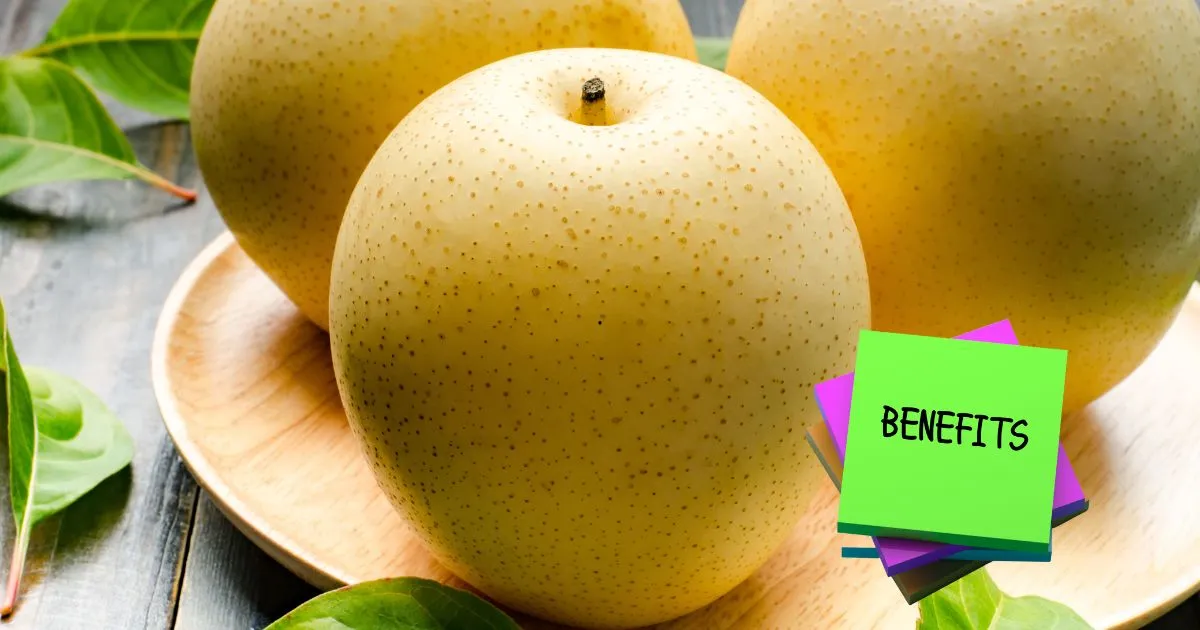Asian Pear Health Benefits: Nature’s Refreshing Fruit for Digestion and Hydration
Table of Contents
A Sweet Bite of Wellness
Imagine biting into a fruit that instantly quenches your thirst, soothes your digestion, and leaves a gentle sweetness on your tongue. That’s what you experience when you eat an Asian pear. It’s more than just a fruit—it’s a time-tested wellness booster that has been part of Asian cultures for centuries. Whether you’re looking for a light snack or a natural way to improve your health, this fruit may just be what you need to add to your routine.
If you’ve ever felt bloated after a heavy meal, struggled to drink enough water in a day, or just wanted to eat cleaner without sacrificing taste, then Asian pears deserve a spot on your plate. This article takes you through the most powerful benefits of Asian pears and how they support your digestive system and hydration levels. By the end, you’ll not only understand why this fruit is celebrated across continents but also how you can use it in your own kitchen.
What Are Asian Pears and Where Do They Come From?
Origins and Types
Asian pears originate from East Asia, particularly from China, Korea, and Japan. Unlike Western pears that are soft and buttery, Asian pears are known for their round shape, crisp texture, and refreshing juice content. Some of the most well-known varieties include:
- Hosui: Light brown skin, very juicy.
- Shinko: Golden-brown skin, crisp and sweet.
- Nijisseiki (20th Century): Pale yellow skin, delicately sweet.
Each variety has its own texture and taste, but all share one thing in common: they’re incredibly hydrating and nutrient-rich.
Nutritional Profile of Asian Pears
Here’s a breakdown of what you get in one medium-sized Asian pear:
| Nutrient | Amount |
|---|---|
| Calories | ~50–60 kcal |
| Water Content | ~85–88% |
| Dietary Fiber | ~4 grams |
| Vitamin C | 7–10% DV |
| Potassium | 5–6% DV |
| Antioxidants | Quercetin, chlorogenic acid |
Asian Pear Health Benefits: Why Your Body Will Thank You
1. Supports Digestive Health Naturally
If you’re looking for a gentle and effective way to support your digestive system, Asian pears are a smart option. The fiber found in each pear helps improve bowel regularity, reduce bloating, and nourish your gut microbiome. The combination of soluble and insoluble fiber means you get a balanced approach to digestion.
Soluble fiber helps absorb water and forms a gel-like substance in your intestines, which aids in nutrient absorption. Insoluble fiber, on the other hand, adds bulk to your stool and promotes movement through your digestive tract. Together, they make digestion smoother and more efficient.
2. Boosts Hydration Levels
Hydration is often overlooked until you start feeling tired or get headaches. Asian pears are made up of more than 85% water, making them an ideal natural hydrator. Instead of forcing yourself to drink another glass of water, you can enjoy a juicy pear and give your body the moisture it needs.
This is especially helpful after workouts, on hot days, or when you’re feeling sluggish. A water-rich snack like this keeps your energy levels stable and supports better circulation.
3. Promotes Healthy Skin
When your body is properly hydrated and filled with antioxidants, your skin glows from the inside out. Asian pears are rich in Vitamin C and polyphenols, both of which contribute to collagen production and skin protection.
Vitamin C is essential for the formation of collagen, the protein that keeps your skin firm and elastic. Meanwhile, antioxidants fight free radicals that damage skin cells. If dry skin or premature aging has been bothering you, adding this fruit to your diet could make a noticeable difference.
4. Helps Regulate Blood Pressure and Heart Health
Potassium, a key mineral found in Asian pears, plays a crucial role in regulating blood pressure. It helps counteract the effects of sodium, which can raise your blood pressure levels.
Additionally, the fiber and antioxidants found in Asian pears may lower LDL (bad) cholesterol and support artery health. Over time, this contributes to a stronger cardiovascular system and reduces the risk of chronic heart conditions.
5. May Help Manage Weight
Trying to lose or manage weight? Asian pears are low in calories but high in fiber, which means they keep you full longer without adding extra calories to your day. One medium pear can be the perfect snack between meals to curb hunger and prevent overeating.
The natural sweetness also makes it a great substitute for sugary snacks or desserts.
How to Eat Asian Pears for Maximum Health Benefits
Raw and Fresh
- Slice and eat as a refreshing snack.
- Add to fruit salads.
- Grate into slaws or over yogurt.
Juiced or Blended
- Make smoothies or juices.
- Combine with cucumber, lemon, or ginger for a cleansing drink.
Cooked or Baked
- Bake with cinnamon for a light dessert.
- Add to stir-fries or noodle dishes for a hint of sweetness.
In Traditional Medicine
Asian pears are used in Traditional Chinese Medicine to soothe sore throats and support lung health. One popular preparation is boiling Asian pear with ginger and honey to make a warm, healing tea.
Easy Recipes Using Asian Pears
1. Asian Pear Smoothie for Gut Health
| Ingredient | Quantity |
| Chopped Asian pear | 1 medium |
| Greek yogurt | 1/2 cup |
| Grated ginger | 1/2 tsp |
| Honey | 1 tsp |
| Ice cubes | As needed |
Instructions: Blend all ingredients until smooth. Drink cold to enjoy a fiber and probiotic-rich boost.
2. Korean-Style Grated Pear Marinade
| Ingredient | Quantity |
| Grated Asian pear | 1/2 cup |
| Soy sauce | 3 tbsp |
| Minced garlic | 2 cloves |
| Sesame oil | 1 tbsp |
| Chili flakes (optional) | To taste |
Instructions: Use this as a marinade for beef, tofu, or mushrooms. It adds a natural sweetness and tenderizing effect.
3. Hydrating Detox Water
| Ingredient | Quantity |
| Sliced Asian pear | 1/2 fruit |
| Cucumber slices | 1/2 cup |
| Lemon wedges | 2–3 pieces |
| Fresh mint leaves | Few sprigs |
| Cold water | 1 liter |
Instructions: Let it steep overnight in the fridge. Drink throughout the day for a gentle detox.
Tips for Choosing and Storing Asian Pears
Choosing the Best Pears
- Look for fruit that feels firm but not rock-hard.
- Avoid bruised or overly soft spots.
- Skin color depends on the variety (golden, yellow, or greenish).
Storing for Freshness
- Keep them in the refrigerator to maintain crispness.
- Best consumed within 1–2 weeks.
- Store separately from apples or bananas to prevent over-ripening.
Frequently Asked Questions (FAQ) About Asian Pear Health Benefits
What are the main Asian pear health benefits?
They help with digestion, hydration, skin health, and blood pressure management while being low in calories and high in fiber.
Can Asian pears help with constipation?
Yes. The fiber content encourages regular bowel movements and nourishes healthy gut bacteria.
Is it better to eat them raw or cooked?
Raw preserves the most nutrients and hydration. Cooked pears are easier to digest but may lose some vitamin C.
Are Asian pears good for weight loss?
Definitely. They’re filling, hydrating, and low in calories, making them ideal for weight-conscious eaters.
How often should I eat Asian pears?
Enjoying one pear a day can offer steady digestive support and hydration benefits.
Conclusion: Why You Should Add Asian Pears to Your Wellness Routine
Asian pears are more than just a seasonal treat. They’re nature’s way of helping you take care of your body, from the inside out. With a unique balance of water, fiber, and nutrients, this fruit delivers benefits that go beyond the plate.
By incorporating Asian pears into your diet, you’re choosing better digestion, glowing skin, stronger hydration, and more balanced energy. And the best part? They’re delicious, versatile, and easy to add to your routine.
Ready to Experience the Benefits?
Next time you’re at the market, pick up a few Asian pears and try one of the recipes above. You might be surprised at how something so simple can make you feel so good. And once you do, don’t forget to share this discovery with your friends and family—they deserve to feel great, too.








